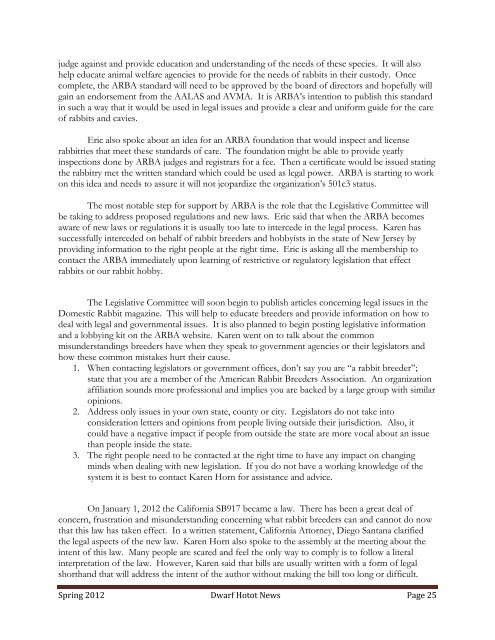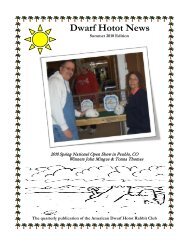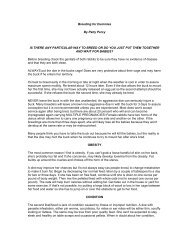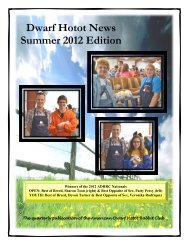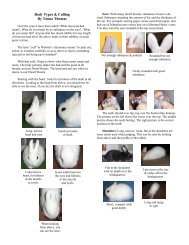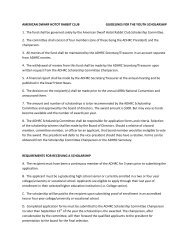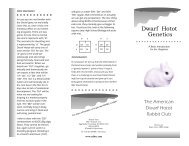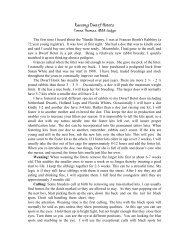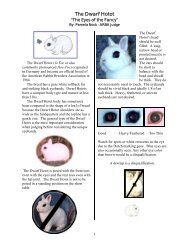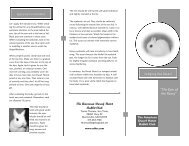2012 Spring Issue - the American Dwarf Hotot Rabbit Club
2012 Spring Issue - the American Dwarf Hotot Rabbit Club
2012 Spring Issue - the American Dwarf Hotot Rabbit Club
Create successful ePaper yourself
Turn your PDF publications into a flip-book with our unique Google optimized e-Paper software.
judge against and provide education and understanding of <strong>the</strong> needs of <strong>the</strong>se species. It will also<br />
help educate animal welfare agencies to provide for <strong>the</strong> needs of rabbits in <strong>the</strong>ir custody. Once<br />
complete, <strong>the</strong> ARBA standard will need to be approved by <strong>the</strong> board of directors and hopefully will<br />
gain an endorsement from <strong>the</strong> AALAS and AVMA. It is ARBA’s intention to publish this standard<br />
in such a way that it would be used in legal issues and provide a clear and uniform guide for <strong>the</strong> care<br />
of rabbits and cavies.<br />
Eric also spoke about an idea for an ARBA foundation that would inspect and license<br />
rabbitries that meet <strong>the</strong>se standards of care. The foundation might be able to provide yearly<br />
inspections done by ARBA judges and registrars for a fee. Then a certificate would be issued stating<br />
<strong>the</strong> rabbitry met <strong>the</strong> written standard which could be used as legal power. ARBA is starting to work<br />
on this idea and needs to assure it will not jeopardize <strong>the</strong> organization’s 501c3 status.<br />
The most notable step for support by ARBA is <strong>the</strong> role that <strong>the</strong> Legislative Committee will<br />
be taking to address proposed regulations and new laws. Eric said that when <strong>the</strong> ARBA becomes<br />
aware of new laws or regulations it is usually too late to intercede in <strong>the</strong> legal process. Karen has<br />
successfully interceded on behalf of rabbit breeders and hobbyists in <strong>the</strong> state of New Jersey by<br />
providing information to <strong>the</strong> right people at <strong>the</strong> right time. Eric is asking all <strong>the</strong> membership to<br />
contact <strong>the</strong> ARBA immediately upon learning of restrictive or regulatory legislation that effect<br />
rabbits or our rabbit hobby.<br />
The Legislative Committee will soon begin to publish articles concerning legal issues in <strong>the</strong><br />
Domestic <strong>Rabbit</strong> magazine. This will help to educate breeders and provide information on how to<br />
deal with legal and governmental issues. It is also planned to begin posting legislative information<br />
and a lobbying kit on <strong>the</strong> ARBA website. Karen went on to talk about <strong>the</strong> common<br />
misunderstandings breeders have when <strong>the</strong>y speak to government agencies or <strong>the</strong>ir legislators and<br />
how <strong>the</strong>se common mistakes hurt <strong>the</strong>ir cause.<br />
1. When contacting legislators or government offices, don’t say you are “a rabbit breeder”;<br />
state that you are a member of <strong>the</strong> <strong>American</strong> <strong>Rabbit</strong> Breeders Association. An organization<br />
affiliation sounds more professional and implies you are backed by a large group with similar<br />
opinions.<br />
2. Address only issues in your own state, county or city. Legislators do not take into<br />
consideration letters and opinions from people living outside <strong>the</strong>ir jurisdiction. Also, it<br />
could have a negative impact if people from outside <strong>the</strong> state are more vocal about an issue<br />
than people inside <strong>the</strong> state.<br />
3. The right people need to be contacted at <strong>the</strong> right time to have any impact on changing<br />
minds when dealing with new legislation. If you do not have a working knowledge of <strong>the</strong><br />
system it is best to contact Karen Horn for assistance and advice.<br />
On January 1, <strong>2012</strong> <strong>the</strong> California SB917 became a law. There has been a great deal of<br />
concern, frustration and misunderstanding concerning what rabbit breeders can and cannot do now<br />
that this law has taken effect. In a written statement, California Attorney, Diego Santana clarified<br />
<strong>the</strong> legal aspects of <strong>the</strong> new law. Karen Horn also spoke to <strong>the</strong> assembly at <strong>the</strong> meeting about <strong>the</strong><br />
intent of this law. Many people are scared and feel <strong>the</strong> only way to comply is to follow a literal<br />
interpretation of <strong>the</strong> law. However, Karen said that bills are usually written with a form of legal<br />
shorthand that will address <strong>the</strong> intent of <strong>the</strong> author without making <strong>the</strong> bill too long or difficult.<br />
<strong>Spring</strong> <strong>2012</strong> <strong>Dwarf</strong> <strong>Hotot</strong> News Page 25


